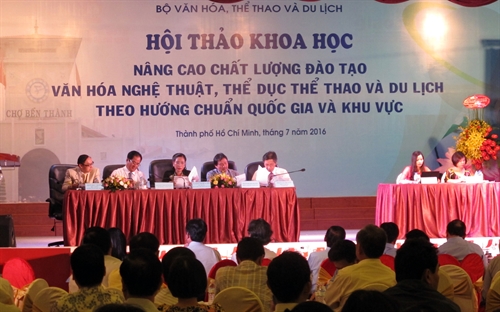 Society
Society

In the context of global integration and competition, a National Qualifications Framework is an important tool to develop a skilled and mobile workforce, experts have said.
 |
| In the context of global integration and competition, a National Qualifications Framework is an important tool to develop a skilled and mobile workforce, experts told a symposium held in HCM City on Tuesday. — Photo Thu Hằng |
HCM CITY— In the context of global integration and competition, a National Qualifications Framework is an important tool to develop a skilled and mobile workforce, experts have said.
The framework would also be a tool for higher education facilities to set out graduation standards, Lê Anh Tuấn of the Ministry of Culture, Sports and Tourism’s Training Department said.
It would support recognition of qualification, promote quality of education and learning as well as international collaboration, he told a symposium held in HCM City on Tuesday.
Most member countries of the ASEAN Economic Community have national frameworks, he said.
Nguyễn Thị Thu Thủy of the Ministry of Education and Training’s Department of Higher Education said her ministry is working with the Ministry of Labour, Invalid and Social Affairs to develop one based on the ASEAN Qualification Reference Framework (AQRF).
AQRF acts as a framework to enable comparisons between qualifications for skilled labour in various ASEAN member states.
With the ASEAN Economic Community (AEC) being formed - at the end of last year - agreements mutually recognise education, experience, licences and certifications obtained in any of the ASEAN member countries in eight professions, including tourism, Thủy said.
Education and training in tourism need to prepare for a free flow of skilled workers under the AEC, she said.
Đồng Xuân Đảm, head of the National Economics University’s international education institution, said tourism school graduates fail to meet skill and foreign language requirements and employers have to retrain them after recruiting.
Thus, tourism and hospitality companies would opt for skilled workers from other ASEAN member countries, particularly for senior management positions, to improve their competitiveness, he warned.
Tourism schools need to improve their quality of training to keep pace with international integration, he warned further.
Assoc Prof Hoàng Minh Phúc of the HCM City University of Fine Arts said the quality of the Vietnamese workforce remains low and lags far behind that of the region.
The World Bank ranks the quality of Vietnamese labour 11th among 12 Asian member countries, he said.
Poor English proficiency is also a major barrier for Vietnamese workers, he said.
The country has 156 tourism training establishments. —VNS




